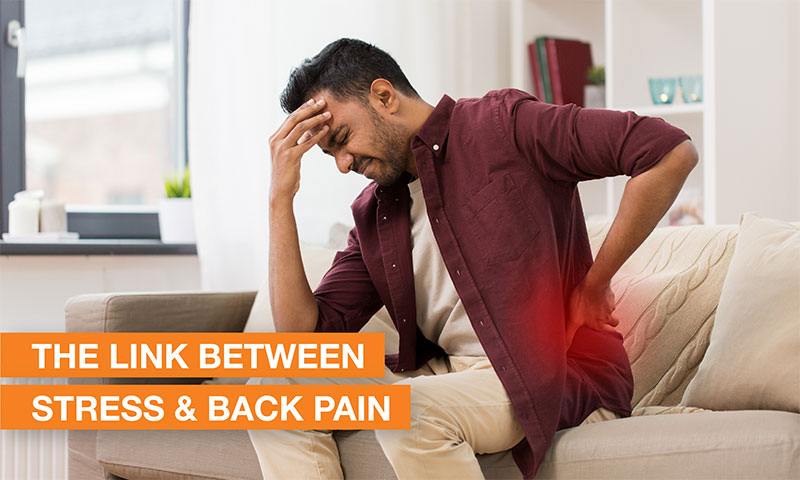Request Appointment
Enter your details and we will be in touch with you shortly;
Or call
8655885566
between 8 am and 8 pm.


Stress can be termed as a physical or psychological state of tension that we as humans feel when subjected to difficult situations. For instance, an upcoming meeting at the office or project submission in college, etc. Stress affects the body in many ways such as weight fluctuation, headaches, mood swings, and of course, dull and shocking neck or back pain. Stress, in fact, is the top cause of back pain while weak muscles, physical work, and being overweight were the other top reasons.
Our spine is a complex piece of biological engineering that packs in bones, ligaments, tendons, muscles, fluids, etc. It runs down from the bottom of the head to the hip bone with 24 vertebrae and three natural curves. When you are subjected to tension in the neck region, it causes neck pain with due credit to poor posture.
Working for hours without stretching or taking a stroll in-between can lead to back pain that could affect mid-back or low-back pain depending upon your posture and other factors.
Back pain is a general musculoskeletal issue that is estimated to affect 80 percent of the world’s population during their lifetimes. If you are experiencing back pain, the common symptoms are soreness or stiffness in the back, dull or sharp back pain, etc. Another symptom could be reduced mobility that makes it difficult to do regular activities. Similarly, your back hurts when you go to sleep or wake up.
When you are stressed, the body undergoes chain reactions thanks to its ‘Flight or Fight Response’. It releases stress hormones such as cortisol and norepinephrine initiating a reaction. With repeated stress episodes, the body becomes desensitised to cortisol leading to inflammation, risk of sciatica, and chronic low back pain, among others. It explains how stress translates to physical back pain.
According to research, there are a few touchpoints that can lead to stress-induced pain. For instance, poor posture is undoubtedly one of the biggest reasons why you would get back pain in the first place. People usually have slouched posture especially when sitting on an office chair or when doing some heavy lifting with a bad posture involved.
When there’s an influx of stress, blood vessels in the body constrict leading to reduced blood flow, especially in the back muscles. In fact, improved posture leads to better blood circulation which is why attaining a good posture should be the aim.
The body is a well-oiled machine that requires nutrition, stretches, good eating habits, etc, to perform well. Chronic stress in the body gives rise to inflammation that can end up in pain, especially around the back. A well-balanced diet can help reduce inflammation that you will read more about in the next section.
Too much stress can increase your body’s sensitivity towards pain which translates to, the more sensitive your body is to pain, the more pain you will feel.
You could be doing a desk job that involves sitting for hours or you could be standing for a prolonged period. Doing so for hours on end does add pressure on the spine leading to compression and the back pain associated with it. The muscles feel fatigued as well which contributes to the pain. However, stretches such as Cat-Cow, and Knee-to-Chest among others can help your body relax, the spine to decompress and the muscles to open up. It is recommended to take a walk every now and then to stretch out a bit. It relieves the tension of the spine giving it a new lease of life.
There’s no denying that we usually end up eating junk food which can be potentially dangerous to our bodies. Eating a well-balanced and nutritious diet including veggies and fruits will end up working in your favor. Eating healthy translates into better health which is a key aspect of weight loss. You will feel energetic once you start consuming a healthy diet which is a good sign of better health.
Practice mindfulness and meditation to give your body a sense of relief from your hectic schedule. A few minutes every day will be enough where you can practise a lot including relaxation activities, deep breathing, etc to manifest good energy and expel bad energy from your body. It is also one of the key coping mechanisms for managing back pain and no doubt it has attracted acclaim and accolades for its effectiveness.
Applying heat around the areas where it hurts the most relaxes the muscles pulling away the excess stress and reducing pain accordingly. You can take a heating pad or take a warm bath to give your body a rejuvenating heat therapy that also relieves you from stress.
As per studies, sleep has a strong correlation with back pain. Lack of sleep can lead to chronic back pain as the body is deprived of making restorative changes which happen during your sleep. 7 to 9 hours appears to be an ideal timeline to sleep and give the body enough time to recoup from previous activities, unleash cell repair and make other changes for better health.
If you are experiencing stress-induced back pain, it is better to consult a professional at the earliest. You can reach out to us at 086558 85566 to book an appointment with QI Spine Clinic.
Visit our nearest clinic for your first consultation